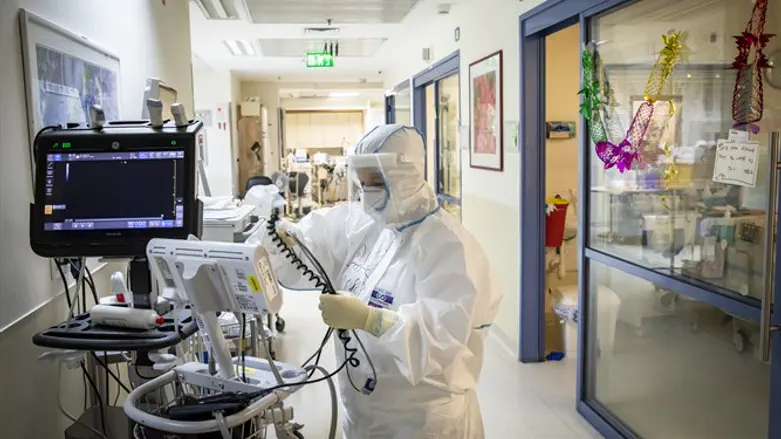
The National Information and Knowledge Center for the War on Coronavirus, staffed by IDF intelligence officers, published a report that says since the beginning of the COVID-19 outbreak, there have been repeated instances of a variety of ongoing complications and disabilities that appear among some of those recovering, including those who suffered only mild symptoms.
"The symptoms of the disease can last for many months even after the disease has passed - regardless of the basic health condition and the patient's age," the report said. "According to various estimates, up to a third of all recoverers suffer from some persistent symptoms, even months after their recovery."
According to studies, about 10% of recoverers who were defined in mild condition continued suffering symptoms about a month after their recovery, with about 5% reporting symptoms even after many months. The symptoms may improve over time, but in some recoverers the course may have ups-and-downs and be ongoing.
The Military Intelligence report says that from the information available so far, a wide range of ongoing damage arises in various body systems:
Nervous System: Even in cases where the initial illness was mild, a significant percentage of recoverers suffer prolonged symptoms (up to 80% in some studies), including persistent and severe fatigue (even months after recovery), headaches, sleep disorders, difficulty concentrating and impaired memory, problems with daily functioning, and ongoing taste and smell impairment (up to about 10% of patients). Late and rare damage to the peripheral nervous system were also reported.
Cardiovascular system (heart): According to various studies, up to half of patients suffer cardiac dysfunction such as arrhythmias and myocarditis of varying severity, some of which are even latent. These symptoms can occur regardless of the background disease or the severity of coronary heart disease, even among young patients, and last for many months, even among those who did not need hospitalization. The long-term significance of the milder cardiac symptoms has not yet been elucidated.
Respiratory system: Many recoverers suffer persistent breathing and coughing difficulties (even for months), and a decrease in physical fitness and endurance. According to several reports, some recoverers suffer scarring (fibrosis) of the lung tissue, the long-term significance of which has not yet been clarified.
Also known are many other ongoing injuries, among them: Mental disorders such as depression and anxiety, hair loss, rashes, hearing and tinnitus damage, abdominal pain and persistent diarrhea, muscle and joint pain, and even an increased risk of developing diabetes.
Military Intelligence experts recommend weighing the need for early respiratory rehabilitation in patients to shorten recovery time from lung injury, psychological follow-up to recovery, and establishing dedicated recovery clinics for follow-up and rehabilitation.
"Beyond the consequences that these complications and damage have for citizens who recovered from the disease, in light of the widespread morbidity in the country, these ongoing complications may have significant consequences for public health, and even heavy economic consequences for the economy even if their incidence is low."
The authors call for "efforts to curb incidence of morbidity among all age groups, including the young and healthy." At the same time, they say it is advisable to promote public awareness on the subject, emphasizing the message that coronavirus disease can cause long-term disabilities even among young and healthy people, and therefore everyone should protect themselves from contracting the virus.
However, biomedicine consultant, physicist, and expert in models and algorithm inspection Dr. Uri Gavish told Arutz Sheva that the Military Intelligence report is "quite deceiving. Although some people who are infected with the virus do have a long recovery period, there is currently no evidence of exceptional long-lasting complications in healthy individuals compared to those accompanying other ILI (Influenza Like Illnesses)."
Dr. Gavish continued: "It is absurd to determine long-lasting effects for a disease that we have encountered for less than a year. For high-risk groups, such as people older than 65 or with severe background conditions, COVID-19 may be accompanied with serious complications as is true for many other diseases targeting particularly vulnerable populations.
"However, for most people, infection with SARS-CoV-2 is harmless, and will result with very mild symptoms, if any. For young children, it is a well established fact that the mortality risk from COVID-19 is significantly lower than that of seasonal Flu."
Dr. Gavish cited a letter by 50 world-renowned clinicians, researchers, and imaging specialists, stating there are "no evidences for long-term heart damage in COVID-19 patients," emphasizing "the role the media plays in such baseless speculations."
